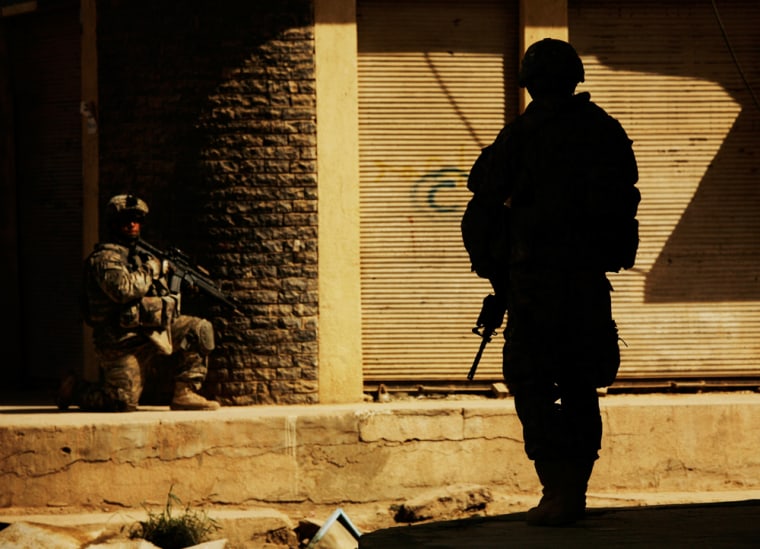The Iraqi foreign minister said Tuesday it will require "bold political decisions" to resolve the major issue standing in the way of a deal allowing American troops to remain here next year — who would try U.S. troops accused of crimes.
Neighboring Iran stepped up pressure against the proposed agreement, with President Mahmoud Ahmedinejad telling a visiting Iraqi official that Iraq had "a duty" to resist the Americans and another Iranian leader warning of unspecified consequences throughout the region.
American and Iraqi negotiators have been working for months to hammer out an agreement governing the operations of U.S. forces in this country after the current U.N. mandate expires at the end of the year.
Iraqi officials say the draft calls for U.S. troops to leave the country by the end of 2011 unless the Baghdad government asks them to stay.
But legal immunity for U.S. soldiers under Iraqi law has emerged as the major obstacle, with neither side able to find language to satisfy the other.
The U.S. wants the exclusive right to prosecute soldiers accused of crimes. The Iraqis want some form of legal jurisdiction over American soldiers as an affirmation of national sovereignty.
'Very close'
Foreign Minister Hoshyar Zebari said the Americans had submitted new ideas and language that "could be acceptable or reasonable." He gave no details and cautioned that the government had not accepted them.
"I don't want to give you any false hope about where we are, but I think we are very close," he told reporters at a press conference with U.S. Deputy Secretary of State John Negroponte.
Zebari said the immunity issue "needs, I think, some bold political decisions. And we are at that stage."
"And that's why I suggested that soon you and your colleagues will see hectic political meetings here in Baghdad on this issue to determine the fate of the agreement."
Negroponte refused to discuss details of the talks, saying only that "both countries are pursuing this issue from the point of view of their own national self-interest."
The deal must be approved by parliament, and Iraqi officials fear opposition unless the agreement satisfies Iraqi nationalists and Shiite politicians with close links to Shiite-dominated Iran.
Against the occupation
An official of one of the Sunni parliamentary blocs, Hamid al-Mutlaq, said no meaningful agreement was possible "between an occupied country and the occupier."
The Iranians hammered home their objections during talks in Tehran with Iraqi parliament speaker Mahmoud al-Mashhadani, a Sunni.
"Today, the duty of the Iraqi government and nation is to resist the extravagance of the occupiers," Iranian state television quoted Ahmadinejad as telling the Iraqi official.
The report also quoted Iran's influential parliament speaker, Ali Larijani, as saying the proposed agreement would have many "unpleasant impacts" on Iraq and regional countries.
"The Iraqi people won't be deceived by propaganda and the psychological warfare launched by the U.S. and its allies to pressure the Iraqi government to approve the security deal," Gen. Masoud Jazayeri, deputy chief of staff at the Iranian armed forces, said in a statement.
"Undoubtedly, the Iraqi leaders are careful of any mischief in this regard and won't allow Iraqi history to be stained with such a disgrace," he added.
In an interview last week with The Associated Press, Prime Minister Nouri al-Maliki insisted he wanted a security agreement with the United States but was facing pressure "from east and west and north and south."
"But we are determined to rise above all these difficulties and pressures because we want this agreement to be passed," al-Maliki said. "And we will go ahead despite all that is being said."
It is unclear what would happen if the talks fail or parliament rejects the agreement. The U.S. could ask the U.N. Security Council to renew the mandate. But al-Maliki said his government would oppose another U.N. resolution because it would infringe on Iraqi sovereignty.
Zebari also said the Iraqi government was committed to an "honorable agreement" and that Iraqi officials were keenly aware of the ongoing security threats despite a sharp decline in violence since last year.
"I think every Iraqi officials is aware of the consequences of any reversal of the present achievement that has been won — hard won — by the sacrifices of the multinational forces, and by the Iraqi security forces," he said.
Unrest continues
Underscoring that threat, two bombs attached to cars exploded shortly before the press conference in the parking lot of the Foreign Ministry, wounding seven people, police said.
In the northern city of Mosul, a U.S. soldier was fatally wounded during a firefight Tuesday when American troops responded to a report that an al-Qaida member with a suicide vest was hiding in a building, the U.S. said.
One Iraqi policeman and a militant were also killed in the clash, which ended when a U.S. aircraft destroyed the building.
A suicide car bomber attacked a U.S. military patrol Tuesday in Mosul, killing an Iraqi civilian and wounding 10 others, said Iraqi police spokesman Brig. Gen. Khalid Abdul-Sattar.
Three American soldiers also were wounded in that attack, said U.S. military spokesman Sgt. Alfredo Jimenez.
The Interior Ministry also announced the arrest of two people in last month's kidnap-slaying of a television crew from the Iraqi television station al-Sharqiya. The crew was abducted in Mosul while filming a program about the Islamic holy month of Ramadan. Their bodies were found about an hour later.
